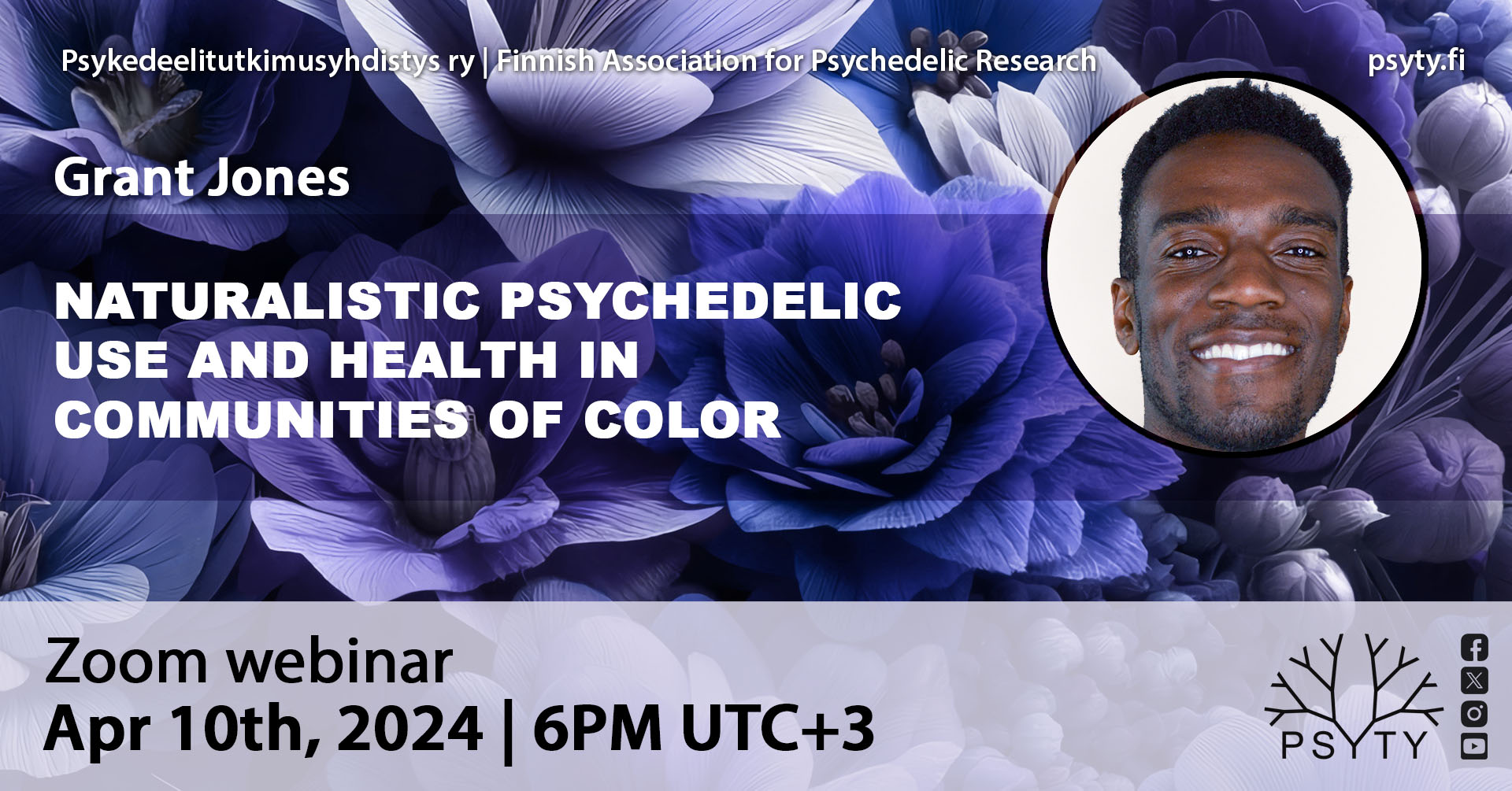Webinar April 10th, 2024: Grant Jones – Naturalistic psychedelic use and health in communities of color

Psychedelics are gaining increased attention in both clinical research and popular culture as they represent novel treatments for a host of difficult-to-treat mental health conditions (e.g., PTSD, depression). Much of this interest has been driven by a number of groundbreaking clinical trials that have demonstrated the possible therapeutic efficacy of these substances in carefully controlled treatment settings. However, these trials have two key limitations. First, they have limited ecological validity (i.e., these findings might not generalize to real-world settings). Second, they feature a severe dearth of participants of color.
Psychology researcher Grant Jones is presenting in a webinar by the Finnish Association for Psychedelic Research on April 10th, 6PM UTC+3. The talk addresses his research that aims to address the limitations of existing research, providing an overview of his research findings in the field of naturalistic (i.e., non-clinical, real world) psychedelic use and health in communities of color. Additionally, this talk addresses the key next steps inspired by this existing research.
Deviating from our typical webinars, the length of the event is one hour, and the lecture segment will be shorter than normal. Following Jones’s introduction, our host, psychology professor Markus Jokela, will present his initial reflections on the presented research, which will then be followed by an audience discussion segment.
Tickets are available from our web store. The event is free for charge for members who’ve paid their membership fee for 2024. If you want to pay your membership fee for this year or become a member, you’ll find our membership products on the main page of our web store. If you’ve already paid your membership fee, you’ll find your free registration link in the email about this event or the web store receipt.
About the speaker:
Grant Jones is a contemplative, musician, and a researcher writing his PhD thesis in the Clinical Psychology PhD program at Harvard University. His research is focused on better understanding how altered states of consciousness play a role in the flourishing of underserved communities. Currently, his research focuses on three core areas – meditation, music, and substance use – and investigating the relationships that these domains share with the well-being of individuals with diverse identities. His substance use research has particularly focused on psychedelic substances like psilocybin (the active compound in “magic mushrooms”) and understanding whether naturalistic (i.e., non-clinical) use of these substances is associated with lowered odds of adverse mental health and behavioral outcomes.
His research uses a number of approaches to study altered states, including epidemiological survey studies and intervention trials. His research has been funded by grants from the Harvard Culture Lab Innovation Fund, the Source Research Foundation, the Harvard Psychology Department, the Mind & Life Institute, and the National Academies of Sciences, Engineering, and Medicine. Additionally, his research has been recognized through awards from the Ford Foundation, the Society for Research in Psychopathology, the Association for Psychological Science, and the Association for Behavioral and Cognitive Therapies Addictive Behaviors Special Interest Group (SIG).
About the host:
Markus Jokela is a professor of mental health research at the University of Helsinki. His educational background is in psychology, sociology, and public health. In his research, Jokela has explored how individual psychological differences are associated with social behaviors that influence population dynamics, e.g., health inequalities, selective residential mobility, and family formation. This research is based on longitudinal studies collected in many different countries. Jokela wants to promote a broader understanding of mental health that considers not only the diagnostic approach but also wider themes of humanity, such as humanistic, existential, and spiritual perspectives. In 2024, he also serves as a board member of the Finnish Association for Psychedelic Research.

Comments are Disabled